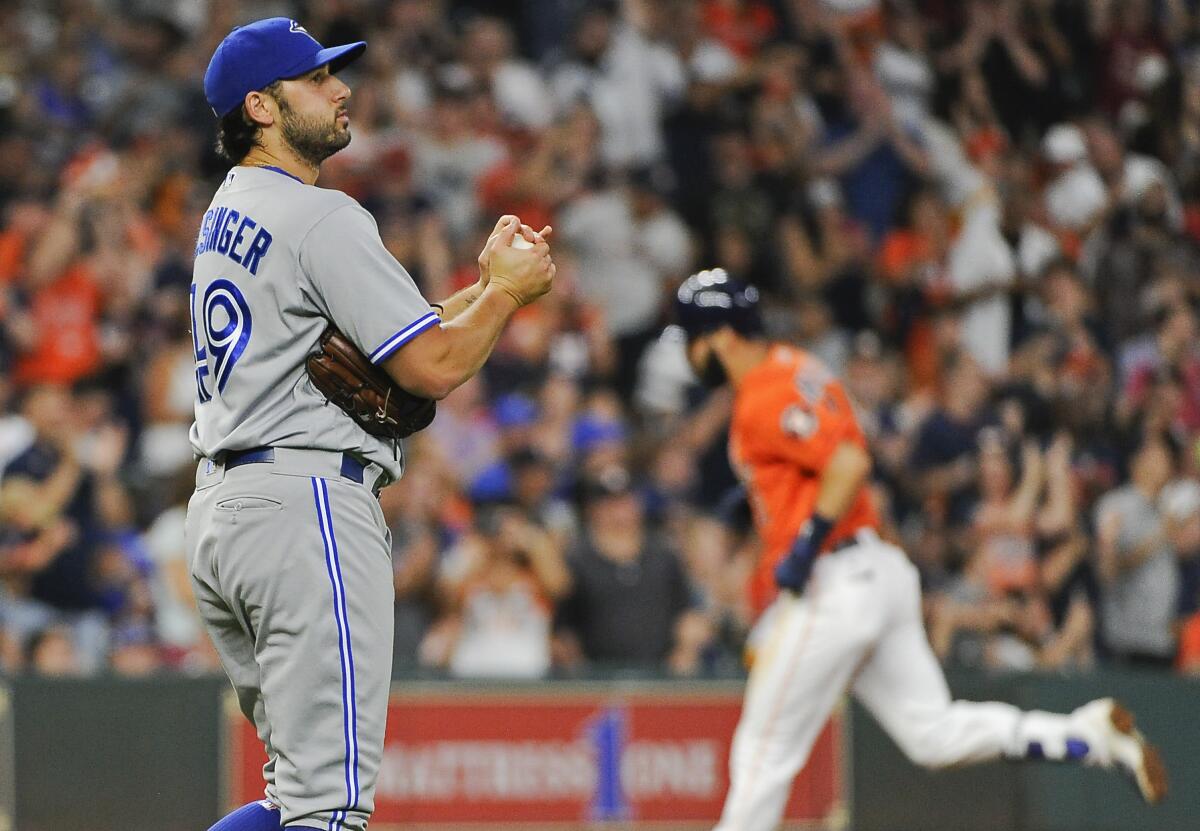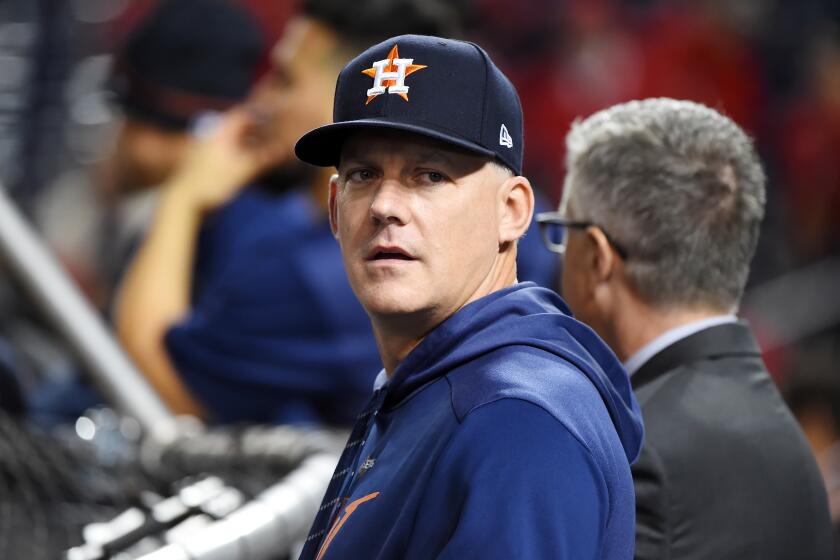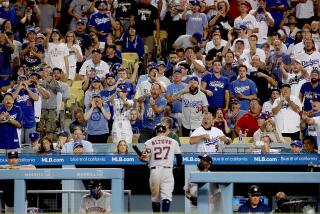Former Dodgers pitcher sues Astros, claiming their sign stealing ended his MLB career

- Share via
A former Dodgers pitcher sued the Houston Astros on Monday, alleging that the Astros’ sign-stealing scheme resulted in a pitching performance so poor that he has been unable to find a major league job since then.
In a suit filed Monday in Los Angeles Superior Court, Mike Bolsinger asked that the Astros be assessed $31 million in restitution — an amount believed to be equal to their postseason award bonuses in 2017 — and that the money be donated to charities.
The suit listed several reasons for filing in Los Angeles, including the claim that the city was “where the defendant Astros fraudulently won the 2017 World Series.”
Bolsinger, who pitched for the Dodgers in 2015-16 before joining the Toronto Blue Jays in 2017, made his last major league appearance in Houston on Aug. 4, 2017. He faced eight batters, seven of whom reached base. He threw 29 pitches — with 12, according to the suit, preceded by the bangs on a trash can that have since been revealed to be the sounds used to alert Astros batters that an offspeed pitch was coming.
In an interview with MLB Network, former Astros manager A.J. Hinch said he should have done more to prevent his team from illegally stealing signs
“For a journeyman pitcher … a disastrous inning, such as what took place in Houston on August 4th, could and did prove to be the death knell” of Bolsinger’s major league career, according to the suit.
Bolsinger has not pitched in the majors since then. He pitched in Japan the last two seasons. His contract there had expired, and he and his wife wished to return to the United States, with their 19-month-old son.
“I play catch every day,” he said. “I’m still trying to get minor league offers. I really have nothing.”
Bolsinger, 32, is 8-19 with a 4.96 earned-run average in his major league career. Those statistics would cause skeptics — and almost certainly the Astros’ lawyers — to scoff at the notion that one game changed the course of his career.
However, he said, the Blue Jays had just converted him from a starter to a reliever. Every outing was critical in the Jays’ evaluation of whether to keep him.
”That type of journeyman guy I am, a guy that might be on the fringe, you only get so many opportunities,” he said. “You can’t be a guy like that and go out there and have an outing like I did.”
In December, The Athletic reported that nine pitchers were released or demoted after poor performances at Houston in 2017. Bolsinger is the only one that has not pitched in the major leagues or minor leagues since then.
He said he does not know — particularly as a self-described player “on the fringe” — whether major league teams might blackball him, whether they might prefer to round out their triple-A rosters with a player who is not suing the Astros.
“Honest question,” he said. “I just want to do what’s right. To me, what they did was wrong. At some point, you have to stand up. I don’t know what’s going to happen with me, if teams are going to want me. The message I really want to send here is that I want baseball to be played the right way. The integrity of the game has been hurt throughout the years. This puts it right on top, of the integrity being lost in this game.
“This is a game I’ve given my whole life to. I sacrificed a lot of stuff for this. I’m going to keep practicing, and keep staying in shape, and hopefully a team will look past all this and see that they have a guy who really just wants to play baseball.”
In announcing MLB’s discipline against the Astros, commissioner Rob Manfred said the team’s high-tech cheating schemes “were not an initiative that was planned or directed by the club’s top baseball operations officials.” On Friday, the Wall Street Journal reported that the league’s investigation had uncovered Astros’ front-office emails showing general manager Jeff Luhnow had been kept apprised of a computer program called “Codebreaker,” designed to decipher the signs of opposing teams.
If the Astros are not successful in getting the suit thrown out of court, Bolsinger could be entitled to obtain records from — and conduct depositions with — officials from the Astros and Major League Baseball.
“This is something you don’t want to be tucked under the rug,” Bolsinger said. “People want answers.”
His attorney, Ben Meiselas, would not say whether he has had discussions with other players that might be interested in joining Bolsinger’s lawsuit.
“I can’t get into that yet,” Meiselas said. “But I can tell you what he is doing is going to, I think, inspire others to seek accountability and not just cover this thing up.”
The Astros had no comment on Bolsinger’s lawsuit, team spokesman Gene Dias said.
In addition to whatever damages the court might award him, Bolsinger asked that the Astros be ordered to pay the $31 million to be used “exclusively for charitable causes focused on bettering the lives of children with an emphasis on charities in Los Angeles as well as a fund for elderly retired professional baseball players in need of financial assistance.”
More to Read
Are you a true-blue fan?
Get our Dodgers Dugout newsletter for insights, news and much more.
You may occasionally receive promotional content from the Los Angeles Times.









